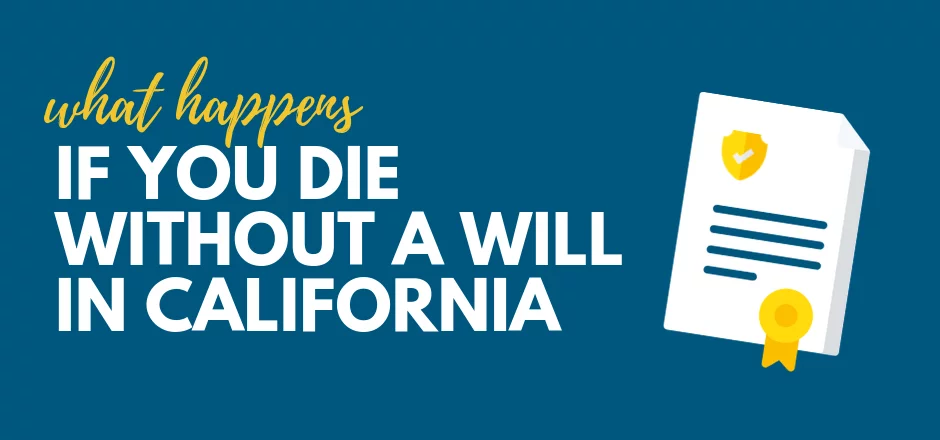What Happens If You Die Without a Will in California?
Taking the time to create a will or trust is important to the future of your family. It ensures your estate is distributed to the right people in the event of your death. In this article, you will discover what happens if you die without a will in California.
What Happens If You Die Without a Will in California?
So, what happens if you die without a will in California?
California state law states that anyone who dies without a will is considered to have died “intestate.” As a result, intestate succession laws will dictate how the deceased’s property is distributed. In California, this means the property is passed down to your closest relative(s).
The catch is that the only assets that can be distributed intestate are those that would have normally been passed through a will. This type of property usually includes cash (including money in checking and savings accounts), stocks, bonds, copyrights, personal property (including clothing, jewelry, collectibles, etc.), and even a person’s ownership interest in a business.
Items that can not be passed intestate include:
- Anything that is already included in a living trust
- Life insurance proceeds (they already have a designated beneficiary)
- Funds in retirement accounts (they usually already have a designated beneficiary)
- The property you own jointly with another person (automatically transfers to the co-owner)
- Anything that already has a payable or transfer-on-death designation
Determining the Heir in California
California courts don’t have an easy job to do when it comes to determining who a person’s heirs are, especially if custody of minor children isn’t clear. There are a lot of variables to take into consideration, including whether or not the deceased was married or has any children.
Examples of what the court might do if the decedent was married include:
- Transfer ownership of all community property to the spouse;
- If the decedent has a living child, the court would give half of separate property to the spouse and half to the child;
- If the decedent has a deceased child, the court would give half to the living spouse and half to the deceased child’s estate;
- If the deceased had more than one child, the court will give one third to the surviving spouse and the remaining two-thirds is split between the children.
Examples of what the court might do if the decedent was not married include:
- Splitting the property among children, though the amounts they get will depend on if they are from the same generation;
- Split the estate among grandchildren if the children are no longer alive;
- Split the estate among the decedent’s parents if there are no children or grandchildren;
- Split the estate among the decedent’s siblings if there are no children, grandchildren, or living parents;
- Split the estate among grandparents if there are no living parents; or
- Split the estate among cousins if there are no living grandparents.
There are quite a number of other complications and rules to consider in the state of California. As you can see, though, dying without a will means your estate — the result of your lifetime of hard work — may ultimately be distributed in ways you never thought of or intended.
What About Minor Children?
While dying without a will can be complicated, an untimely passing that involves minor children can be even more difficult to process. At the end of the day, the court will have the final say when it comes to who takes guardianship.
If they are capable of caring for them, the courts will often turn to grandparents first. If your parents are no longer living, they will look to the nearest blood relatives, such as aunts and uncles.
This can, of course, become even more complicated. Let’s say both parents pass away in an untimely accident and both sets of grandparents are living and capable of caring for their grandchildren. If they disagree as to who should take guardianship, the children may end up caught in the middle of an unpleasant custody battle while each side tries to prove they are better suited for the task, and why.
Estate Planning in California
The best way to ensure your property is distributed the way you’d like, and that your children (if any) are cared for, is to take care of your own estate planning in advance. While there are free forms you can get from the internet or from bulk legal services, it is often safer to work with an estate planning attorney to make sure all of your bases are covered properly.
When planning your estate, don’t forget to consider:
- How you will distribute property between your spouse and/or children;
- Whether or not you have a back-up plan for minor children in the event that you and your spouse should pass prematurely;
- Who will care for any beloved family pets;
- Who will inherit your business interests;
- The inclusion of passwords and login details for online accounts, including investments, banking, cryptocurrency, blogs, and any other digital properties;
- Methods you can use to set up trusts or other transfer-on-death rights to avoid probate and minimize your estate’s tax obligations;
- Planning annual tax-free gifts while living to minimize the value of your estate after death;
- Charitable contributions you’d like to make, living and upon death; and
- Changes to local tax laws during your lifetime.
Estate planning isn’t just for the elderly. It’s for anyone with a family, tangible property, or a desire to control the way their estate is distributed after death. Failure to properly plan in advance could mean those you love, whether you’re married or not, are left with no financial net to fall back on if you pass away, especially unexpectedly.
While your will is one part of your estate plan.
Working with a California estate planning lawyer will ensure you’ve covered all of your bases, from forming trusts to designating the distribution of all of your assets. Leave no stone unturned and no penny unaccounted for. Your estate is your legacy, and you deserve to maintain control over what happens to it after you die.
Are you in search for a certified attorney to represent you?
Let us help you find one today!



